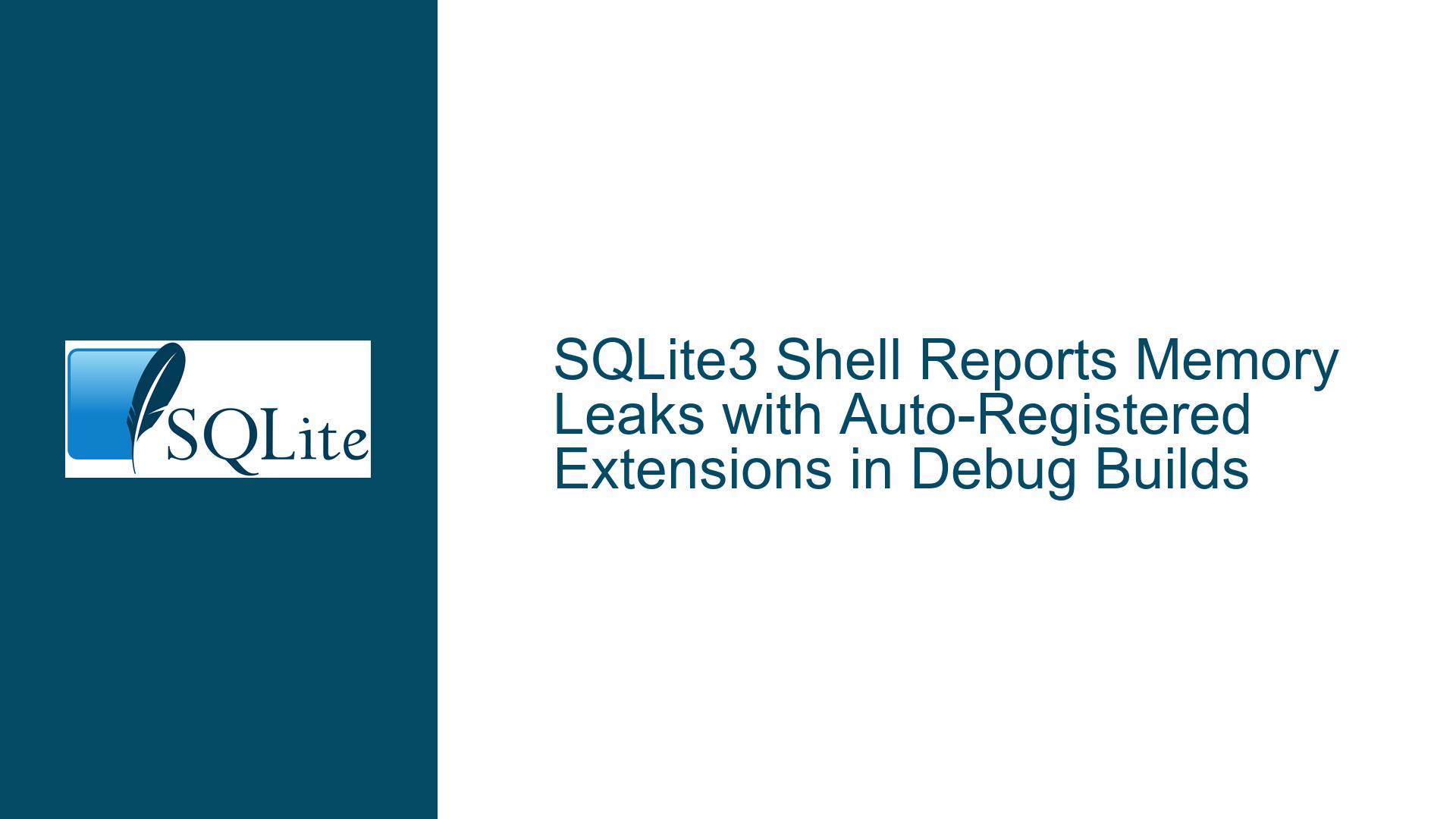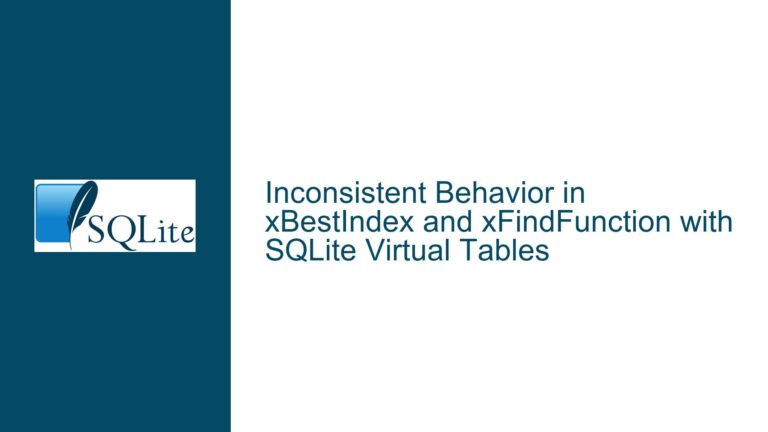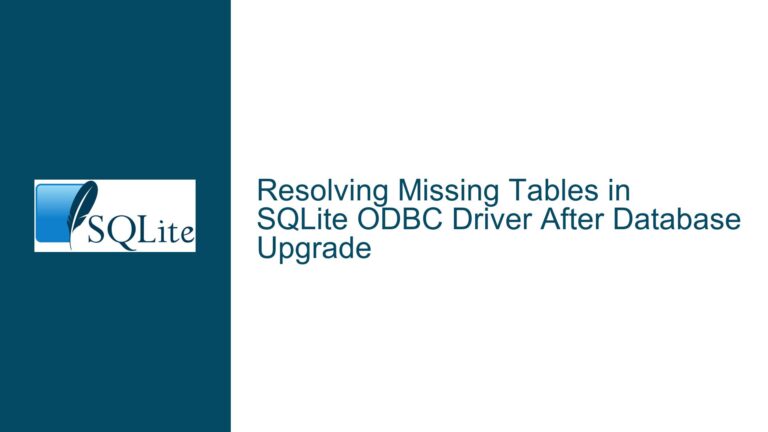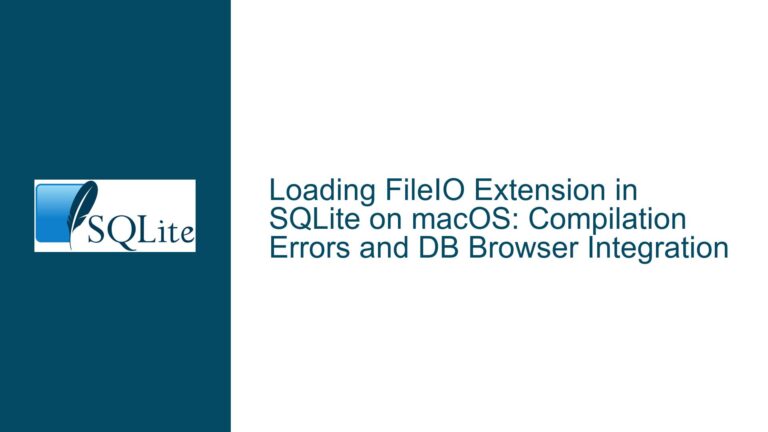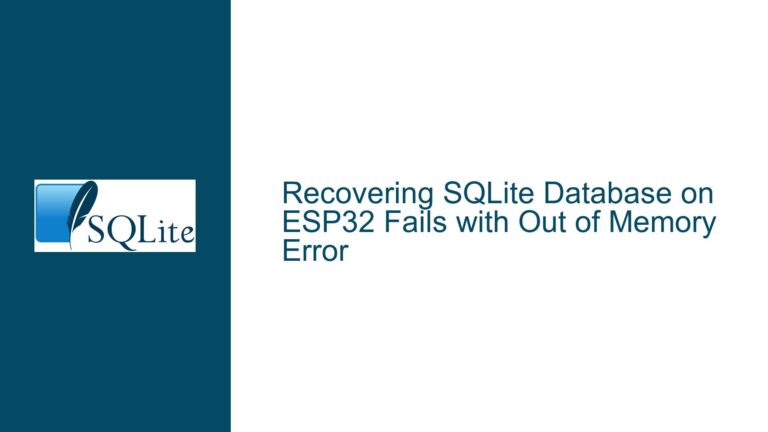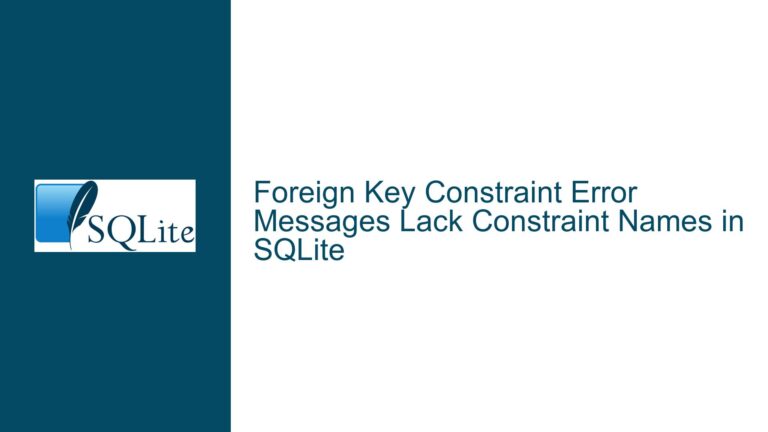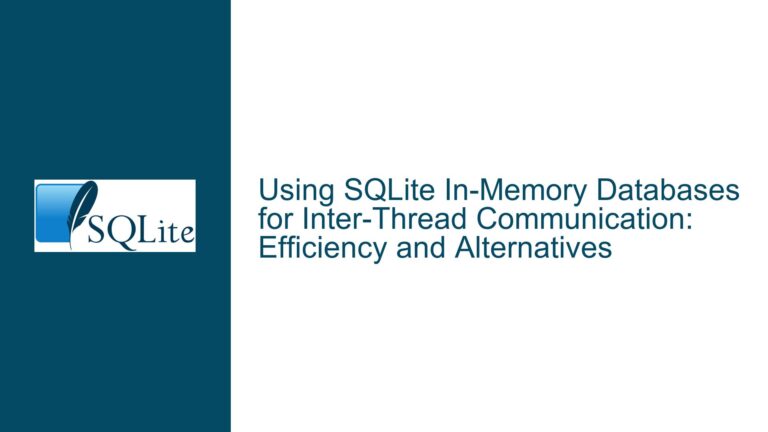SQLite3 Shell Reports Memory Leaks with Auto-Registered Extensions in Debug Builds
Memory Leak Reports During SQLite3 Shell Exit with Auto-Extensions and Debug Flags
Issue Overview: Debug-Built SQLite3 Shell Flags Memory Leaks After Auto-Extension Registration
When compiling the SQLite3 command-line shell (CLI) with the SQLITE_DEBUG flag and leveraging the SQLITE_EXTRA_INIT mechanism to register extensions via sqlite3_auto_extension, users encounter a memory leak warning upon exiting the shell. The leak report manifests as a non-zero byte count (e.g., "Memory leaked: 160 bytes") after executing .exit or .quit. This occurs even when extensions are correctly deregistered using SQLITE_EXTRA_SHUTDOWN and sqlite3_cancel_auto_extension.
The root observation is that the SQLite3 shell does not invoke sqlite3_shutdown() during normal exit sequences. This function is responsible for deallocating resources tied to the SQLite library’s global state, including memory allocated for auto-registered extensions. When SQLITE_DEBUG is enabled, the shell includes a final check via sqlite3_memory_used() to report unfreed memory. Since sqlite3_shutdown() is not called, the memory occupied by the auto-extension registry remains allocated, triggering a false positive leak report.
A secondary complication arises on Windows: the shell initializes SQLite twice due to legacy encoding-handling requirements. This double initialization amplifies the reported leak size (e.g., 160 bytes instead of 80) because the auto-extension registry is allocated during both initialization cycles but never freed. While this does not indicate an actual memory leak (the OS reclaims process memory on exit), it complicates debugging workflows where developers rely on the debug shell’s leak report to validate their code.
Key technical relationships at play:
sqlite3_auto_extensionand Global State: Extensions registered via this API are stored in a static array within the SQLite library. This array persists until explicitly cleared viasqlite3_cancel_auto_extensionor untilsqlite3_shutdownreleases it.SQLITE_DEBUGand Memory Tracking: EnablingSQLITE_DEBUGactivates internal memory accounting, including checks for unfreed allocations at shell exit.- Shell Initialization Logic: The CLI shell initializes SQLite via
sqlite3_initialize()but omitssqlite3_shutdown()unless forced by specific edge cases (e.g., Windows argument encoding conversion).
This issue primarily affects developers embedding static extensions into custom SQLite builds or debugging extension-loaded environments. While not harmful in production (memory is reclaimed by the OS), it undermines confidence in the debug toolchain and complicates leak detection in user-defined extensions.
Underlying Causes: Shell Initialization Design, Omission of Shutdown, and Auto-Extension Lifecycle
Cause 1: SQLite3 Shell Omits sqlite3_shutdown During Normal Exit
The SQLite3 CLI shell is designed to prioritize simplicity and portability over rigorous resource cleanup. Per SQLite’s API documentation, workstation applications are not required to call sqlite3_shutdown(), as the operating system reclaims memory and resources upon process termination. However, debug builds with SQLITE_DEBUG enabled include a post-exit memory check that assumes all SQLite-managed memory should have been released by that point. Since the shell does not invoke sqlite3_shutdown(), the auto-extension registry (allocated during sqlite3_initialize()) remains in memory, causing sqlite3_memory_used() to flag it as a leak.
Cause 2: Double Initialization on Windows Amplifies Leak Reports
On Windows platforms, the shell initializes SQLite twice if the environment uses a non-UTF-8 encoding. The first initialization occurs during startup, and the second happens after converting command-line arguments to UTF-8. Each initialization allocates a separate auto-extension registry. Since neither initialization is paired with a sqlite3_shutdown(), both registries remain allocated, doubling the reported leak size. This behavior is intentional, as noted in the shell’s source code comments, but exacerbates confusion when debugging.
Cause 3: Auto-Extension Registration Bypasses Shell’s Cleanup Mechanisms
Extensions registered via sqlite3_auto_extension are intended for scenarios where the SQLite library is statically linked, and extensions cannot be loaded dynamically (e.g., via .load or SELECT load_extension()). The registry for these extensions is maintained in the SQLite library’s global state, which is only cleared by sqlite3_shutdown(). Since the shell does not call this function, the registry persists until process exit, conflicting with the debug memory checker’s expectation of a clean state.
Cause 4: Ambiguity in sqlite3_memory_used Validity Post-Shutdown
The SQLite API does not explicitly state whether sqlite3_memory_used() remains valid after sqlite3_shutdown(). In practice, calling sqlite3_memory_used() after shutdown may return undefined values, as the memory subsystem itself may be deinitialized. This ambiguity discourages the shell from invoking sqlite3_shutdown() before checking for leaks, as it could invalidate the memory accounting mechanism.
Resolution Strategies: Code Modifications, Build Adjustments, and Workarounds
Solution 1: Modify Shell Code to Invoke sqlite3_shutdown Before Exit
Step 1: Locate Shell Exit Logic
In the SQLite3 shell source code (shell.c.in), the main function exits after processing user commands. To insert a shutdown call, modify the exit sequence to invoke sqlite3_shutdown() before returning.
Step 2: Add Shutdown Call
Locate the main function’s cleanup section (typically after the input loop ends). Insert:
sqlite3_shutdown();
This ensures the auto-extension registry is freed before the memory leak check.
Step 3: Handle Platform-Specific Initialization
On Windows, the shell initializes SQLite twice. To avoid double-free errors, ensure sqlite3_shutdown() is called only once. Adjust the code to track initialization count:
int sqlite_initialized = 0;
// During argument conversion on Windows:
if (!sqlite_initialized) {
sqlite3_initialize();
sqlite_initialized = 1;
}
// ... after argument processing:
sqlite3_shutdown();
// Re-initialize for normal operation:
sqlite3_initialize();
This ensures the second initialization occurs after shutdown, preserving the Windows-specific logic while preventing duplicate registries.
Step 4: Rebuild and Test
Recompile the shell with SQLITE_DEBUG enabled and verify that the memory leak report disappears. Test on both Unix-like systems and Windows to confirm consistent behavior.
Solution 2: Adjust Build Flags to Bypass Auto-Extension Registration
Workaround 1: Disable Auto-Extensions
If auto-extensions are not strictly required, avoid using SQLITE_EXTRA_INIT and instead load extensions dynamically via the shell’s .load command or an initialization file (.sqliterc). This sidesteps the global registry issue entirely.
Workaround 2: Use a Custom Wrapper
For applications requiring static extensions, create a wrapper around the SQLite shell that explicitly calls sqlite3_shutdown() on exit. Example in C:
#include <sqlite3.h>
int main(int argc, char **argv) {
sqlite3_initialize();
// Run shell logic here
sqlite3_shutdown();
return 0;
}
Rebuild the shell with this wrapper to enforce cleanup.
Solution 3: Leverage Upcoming SQLite Changes to Auto-Extension Handling
The SQLite team has indicated plans to revise the auto-extension registration mechanism. Monitor SQLite’s changelogs for updates, particularly around the sqlite3_auto_extension API. Once revised, rebuild the shell and library to determine if the leak reports resolve naturally.
Solution 4: Suppress False Leak Reports in Debug Workflows
Option 1: Conditional Compilation
Modify the shell’s memory leak check to ignore known auto-extension allocations. In shell.c.in, locate the #ifdef SQLITE_DEBUG block that prints the leak report. Add a conditional to subtract the size of the auto-extension registry:
size_t leaked = sqlite3_memory_used();
size_t auto_ext_size = calculate_auto_extension_size(); // Custom function
leaked -= auto_ext_size;
if (leaked != 0) {
printf("Memory leaked: %lld bytes\n", leaked);
}
This requires internal knowledge of SQLite’s auto-extension storage structure, which may vary between versions.
Option 2: Disable Leak Reporting
If leak reports are not critical, omit the SQLITE_DEBUG flag during shell compilation. This sacrifices memory debugging for a cleaner exit output.
Solution 5: Adopt Alternative Extension Loading Mechanisms
Approach 1: Dynamic Loading
Instead of statically registering extensions, load them dynamically using runtime commands:
.load /path/to/extension
This avoids the global auto-extension registry and ensures extensions are unloaded on shell exit.
Approach 2: Init File Registration
Place extension load commands in .sqliterc or a startup script. This decouples extension management from the shell’s build process.
By addressing the interaction between SQLite’s auto-extension system, the shell’s initialization design, and debug memory tracking, developers can eliminate false leak reports while maintaining robust extension functionality.
